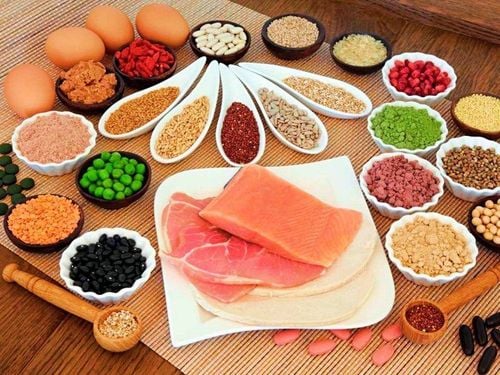This is an automatically translated article.
Malnutrition is a condition that includes overnutrition and undernutrition. People who are undernourished may experience weight loss, fatigue, mood swings, or vitamin and mineral deficiencies. On the other hand, overnutrition can lead to overweight, obesity and micronutrient deficiencies. Both types can lead to serious health problems if left untreated.1. What is malnutrition?
Malnutrition is a serious condition that occurs when your diet doesn't have enough nutrients, in other words, a deficiency or overconsumption of nutrients.Types of malnutrition include:
Undernutrition: This type of malnutrition is the result of the body not getting enough protein, calories or essential micronutrients. It leads to the conditions of low weight for height (thinning), low height for age (stunting) and low weight for age (underweight). Overnutrition: Consuming too much of some nutrients, such as protein, calories or fat can also lead to malnutrition. This often leads to being overweight or obese. In general, undernourished people tend to be deficient in vitamins and minerals, especially iron, zinc, vitamin A, and iodine. However, micronutrient deficiencies can also occur when you are malnourished.
For overweight or obesity can occur because the body consumes too many calories but does not get enough vitamins and minerals at the same time. Food is also a contributing factor to overnutrition, such as fried and high-sugar foods, which tend to be high in calories and fat but low in other essential nutrients.

Suy dinh dưỡng là một tình trạng nghiêm trọng xảy ra khi chế độ ăn uống của bạn không có đủ chất dinh dưỡng
2. Signs and symptoms of malnutrition
The signs and symptoms of malnutrition will vary depending on the type of malnutrition. Detecting the effects of malnutrition can help you determine the right treatment for you early.Malnutrition Usually the result of your body not getting enough nutrients in your diet. This can cause the following problems:
Weight loss Loss of fat and muscle mass Sunken cheeks and sunken eyes Enlarged abdomen Dry hair and skin Slow wound healing Fatigue Difficulty concentrating Irritability Depression and anxiety People who are undernourished may have one or more of these symptoms.
Kwashiorkor is a severe lack of protein in the body, leading to water retention and abdominal distension. Meanwhile, marasmus occurs due to severe calorie deficit, leading to thinness, accompanied by a significant loss of fat and muscle.
In addition, undernutrition can also lead to micronutrient deficiency. Some of the most common deficiencies and their accompanying symptoms often include:
Vitamin A: Causes dry eyes, night blindness and increases the risk of infections Iron: Declines brain function, causes problems temperature regulation and stomach problems Zinc: Leads to loss of appetite, stunting, slow wound healing, hair loss, or diarrhea Iodine: Causes thyroid gland (goiters) to become enlarged, reducing hormone production thyroid gland, which causes growth and development problems In fact, lack of nutrition can lead to serious problems with your physical and health, it even increases your risk of death if not controlled in a timely manner. It has been estimated that stunting, emaciation, zinc and vitamin A deficiency caused approximately 45% of all child deaths in 2011

Thiếu dinh dưỡng có thể khiến bạn rơi vào trạng thái mệt mỏi, trầm cảm, lo âu
Research has shown that people who are overweight or obese are more likely to not absorb enough nutrients and have lower levels of vitamins and minerals in their blood than people of normal weight.
Another study done in adolescents also showed that blood levels of vitamins A and E were 2–10% lower in obese individuals than in overweight participants. normal weight.
This is because being overweight and obese can be the result of consuming too much fast food and processed foods. Because they are high in calories and high in fat, they have very few other essential nutrients for the body.
Also in another study, it was shown that people who eat fast food often absorb very little vitamin A and C, while consuming significantly larger amounts of calories, fat and sodium than who abstain from these foods.
3. Assessment of malnutrition status
Symptoms of malnutrition will be assessed through health exams at the hospital or clinic.Key tools used to identify malnutrition typically include weight loss charts and body mass index (BMI), blood tests for micronutrient status, and a general physical exam.
If you have a history of weight loss and other symptoms related to a nutritional deficiency, your doctor may order additional tests to identify a micronutrient deficiency.
On the other hand, identifying nutrient deficiencies due to overnutrition can be more difficult. If you are overweight or obese, and eat mainly processed and fast foods, your body may not be getting enough vitamins or minerals. To find out if you are suffering from a nutrient deficiency, talk to your doctor about your daily eating habits.

Các triệu chứng của suy dinh dưỡng sẽ được đánh giá thông qua các bài kiểm tra sức khỏe tại bệnh viện hoặc phòng khám
4. How does malnutrition affect health?
Malnutrition can lead to the development of diseases and other chronic health conditions.The long-term effects of undernutrition often include a higher risk of obesity, heart disease and diabetes. In a study in several adolescents, it was found that boys who were stunted by malnutrition early in life gained 5% more fat mass over 3 years than their peers without stunting. Horn. In addition, about 21% of stunted adolescents had higher blood pressure than other healthy adolescents.
Researchers have also found that undernutrition in childhood can cause changes in metabolism, leading to a higher risk of chronic diseases later in life.
Besides, overweight or obese children also have a higher risk of heart disease and type 2 diabetes than other children. Specifically, through a recent study, children with obesity were 4 times more likely to develop type 2 diabetes than children with a normal BMI
Due to the long-term effects of Malnutrition can increase the risk of a number of chronic diseases, so early prevention and treatment of malnutrition can significantly reduce the incidence of these risks.
5. What causes malnutrition?
Malnutrition is a global problem that can result from a variety of factors, including environmental, economic and medical conditions.The World Health Organization (WHO) has estimated that more than 460 million adults and 150 million children are malnourished, while more than two billion adults and children are overweight or obese.
The most common causes of malnutrition often include:
Food insecurity, or lack of access to adequate and affordable food: food insecurity of a country can leave people with food shortages, leading to starvation and increasing the risk of severe malnutrition. Problems digesting and absorbing nutrients: some conditions that cause malabsorption, such as Crohn's disease, celiac disease, and bacterial overgrowth in the gut, can cause malnutrition. too much alcohol: Heavy use of alcohol can prevent the body from absorbing enough protein, calories, and micronutrients. Mental health disorders: Depression and other mental health conditions can increase the risk of malnutrition. In one study, people with depression had about 4% higher rates of malnutrition than healthy people. Inability to obtain and prepare food: researchers have shown that thinness, lack of exercise and lack of muscle strength are risk factors for malnutrition. These problems also contribute to a person's ability to prepare food.

Việc sử dụng nhiều rượu có thể khiến cho cơ thể không hấp thụ đủ được lượng protein, calo và vi chất dinh dưỡng cần thiết
6. People at high risk of malnutrition
Malnutrition can affect people in all parts of the world, but some of the following people are at higher risk, including:People living in developing countries or regions have limited access to food: undernutrition and micronutrient deficiencies are particularly prevalent in sub-Saharan Africa and South Asia. People with increased nutrient requirements, especially children and pregnant or lactating women: In some developing countries, approximately 24-31% of pregnant and lactating mothers suffer from Malnutrition. People living in poverty or with low income: Low socioeconomic status is strongly associated with malnutrition. Older adults, especially those who live alone or have a disability: Research has shown that up to 22% of older adults are malnourished and more than 45% are at risk of being malnourished. People with problems that affect nutrient absorption: People with Crohn's disease or ulcerative colitis are four times more likely to be malnourished than people without these conditions.
7. Measures to prevent and treat malnutrition
To effectively prevent and treat malnutrition, we need to focus on addressing the underlying causes that lead to it.Research has shown that the most effective ways to prevent malnutrition would include providing iron, zinc, and iodine tablets, dietary supplements, and nutrition education to those at risk. Malnourished.
In addition, children and adults who are at risk of being severely undernourished should choose healthy foods and engage in regular physical activity to significantly prevent overweight and obesity. enlarged.
Besides, you can also prevent the risk of malnutrition by eating a well-rounded diet with a variety of foods, including enough carbs, protein, fat, vitamins, minerals, and water. .
On the other hand, the treatment of malnutrition often involves more individualized approaches. If you suspect that you or a loved one is suffering from malnutrition, discuss this with your doctor as soon as possible.
Health care professionals can help you evaluate the signs and symptoms of undernutrition and determine the right interventions for you, such as dietary changes. Nutrition includes supplements.
Currently, Vinmec is one of the few hospitals with a full range of pediatric specialties, able to perform general examinations in conjunction with a nutritionist to help build a baby menu, neurological examination, mental problems, reflexes. In particular, Vinmec has strengths in physical examination with the cooperation of the rehabilitation center for children with autism - cerebral palsy.
If you have a need for medical examination with experienced pediatricians at Vinmec, please book an appointment on the website to be served.
Please dial HOTLINE for more information or register for an appointment HERE. Download MyVinmec app to make appointments faster and to manage your bookings easily.
References: who.int, nhs.uk, healthline.com,












